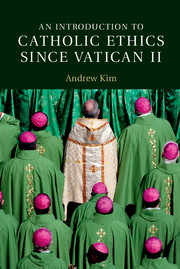Book contents
- Frontmatter
- Dedication
- Epigraph
- Contents
- Foreword
- Preface
- Acknowledgments
- Abbreviations
- Introduction
- PART 1 FOUNDATIONS OF CATHOLIC ETHICS
- PART II GRACE AT THE HEART OF VIRTUE
- PART III CATHOLIC SOCIAL TEACHING
- PART IV BIOETHICS
- 10 The Dignity of the Human Person
- 11 Beginning of Life Decisions
- 12 End of Life Decisions
- Epilogue
- Appendix
- Bibliography
- Index
10 - The Dignity of the Human Person
from PART IV - BIOETHICS
Published online by Cambridge University Press: 05 May 2015
- Frontmatter
- Dedication
- Epigraph
- Contents
- Foreword
- Preface
- Acknowledgments
- Abbreviations
- Introduction
- PART 1 FOUNDATIONS OF CATHOLIC ETHICS
- PART II GRACE AT THE HEART OF VIRTUE
- PART III CATHOLIC SOCIAL TEACHING
- PART IV BIOETHICS
- 10 The Dignity of the Human Person
- 11 Beginning of Life Decisions
- 12 End of Life Decisions
- Epilogue
- Appendix
- Bibliography
- Index
Summary
God created mankind in his image; in the image of God he created them; male and female he created them.
Genesis 1:27Bioethical debates stem from competing notions of human dignity. The fundamental principle of Catholic bioethics states that “the dignity of a person must be recognized in every human being from conception to natural death.” I refer to this as the principle of universal human dignity. The purpose of the current chapter is to elucidate this principle by contrasting it with what I referred to in previous chapters as the “assumption of selective human dignity.”
This chapter unfolds in four sections. First, we examine the “capacities approach,” which attempts to provide philosophical justification for the assumption of selective human dignity, and we analyze the manner in which the Catholic moral philosopher, John Finnis, critiqued this view. Based on this analysis, we are able to discern a way for defending the principle of universal human dignity apart from appeal to revelation or divine authority. Next, we turn to the treatment of human dignity in Gaudium et spes in order to examine the manner in which revelation once again lifts up and perfects what can be found from reason alone. Third, we investigate examples, historical and contemporary, of injustices perpetrated under the banner of the assumption of selective human dignity. Through reference to Thomas Merton, we see how the assumption of selective human dignity is rooted in the sinful tendencies we possess as human beings. Finally, through an analysis of the parable of the Good Samaritan, we observe how a commitment to the principle of universal human dignity is needed to combat these injustices. With this understanding of dignity in place, we will then be equipped, in the remaining chapters, to treat select issues in bioethics from within the framework of the Catholic moral tradition.
- Type
- Chapter
- Information
- An Introduction to Catholic Ethics since Vatican II , pp. 145 - 154Publisher: Cambridge University PressPrint publication year: 2015
- 1
- Cited by



